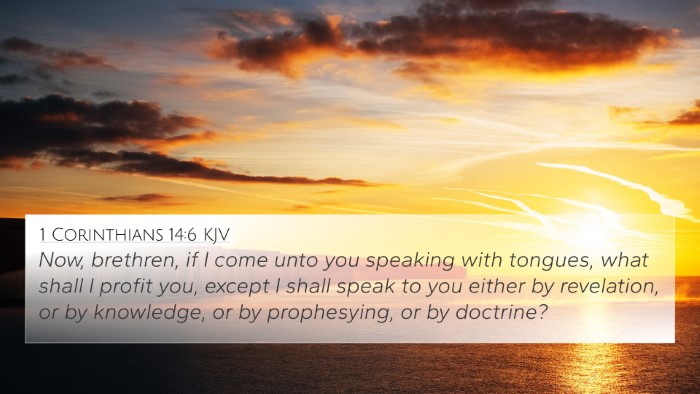Understanding 1 Corinthians 14:17
Verse: 1 Corinthians 14:17 - "For you indeed give thanks well, but the other is not edified."
This verse emphasizes the importance of understanding and clarity in worship and communication within the church. Paul is addressing the practice of speaking in tongues, asserting that while speaking in tongues can be a form of personal edification, it does not necessarily benefit the wider congregation unless there is interpretation or understanding.
Summary of Commentaries
According to Matthew Henry, Paul highlights that speaking in tongues, while a legitimate form of praise, must be followed by interpretation for the congregation to be edified. The act of giving thanks through tongues is commendable, but it remains inadequate for communal growth without the understanding of those present.
Albert Barnes adds that the key aspect is the edification of the church body. He stresses that worship should aim to build up all participants. If an individual speaks in an unknown tongue without interpretation, it leaves the audience uninformed and unedified, which counteracts the purpose of communal worship.
Adam Clarke remarks that this verse serves as a reminder that heartfelt worship, although commendable, must also be accessible to all in order to fulfill its purpose. Clarke points out that efficient communication in the church encourages growth, coherence, and a shared understanding among believers.
Key Themes and Interpretations
- Edification: The primary focus of worship practices should be to build up the community.
- Understanding: Communication in worship needs to be clear for effective participation.
- Personal vs. Corporate Worship: Individual expressions should not overshadow the communal aspect of faith.
- Clarity in Communication: Effective delivery in church practices is essential for everyone's benefit.
- Spiritual Gifts: There should be a balance between individual spiritual gifts and the collective needs of the church.
Cross-References Related to 1 Corinthians 14:17
- 1 Corinthians 14:5 - Explains the importance of prophecy over speaking in tongues unless interpreted.
- 1 Corinthians 14:12 - Encourages believers to strive for gifts that build up the church.
- 1 Corinthians 14:19 - Paul prefers to speak five intelligible words than ten thousand in a tongue.
- Romans 14:19 - Emphasizes pursuing what brings peace and mutual edification.
- Ephesians 4:29 - Advocates for speech that builds others up according to their needs.
- Colossians 1:28 - Promotes teaching and admonishing everyone for building up the faith.
- 1 Thessalonians 5:11 - Encourages mutual encouragement among believers.
Connections Between Bible Verses
This verse creates a dialogue with several others in the New Testament that emphasize the necessity of clarity and understanding in the exercise of spiritual gifts.
Practical Takeaways
- Community Focus: Worship should always be centered around what benefits the congregation.
- Interpretation is Key: Those who speak in tongues should ensure that their communication is interpreted for the benefit of all.
- Engage the Congregation: Leaders should encourage participation in a way that everyone can understand and share.
- Practice Gifts Wisely: Each spiritual gift should be exercised with the church’s collective benefit in mind.
Conclusion
In summary, 1 Corinthians 14:17 calls believers to prioritize communal edification and clarity in worship. It prompts careful thought regarding the use of spiritual gifts and emphasizes the need for mutual understanding in the church community. By cross-referencing this with various passages, we see a consistent biblical theme focused on love, understanding, and the edification of the body of Christ.




